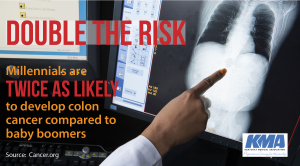
 March is National Colon Cancer Awareness Month. Colorectal cancer is the third leading cause of cancer deaths among women in the United States, and the second leading cause among men, according to the American Cancer Society. The average individual has a 4 to 5 percent risk of colorectal cancer in their lifetime. It’s estimated that physicians will diagnose 135,000 new cases in 2017, and colorectal cancer is expected to cause more than 50,000 deaths in the United States this year.
March is National Colon Cancer Awareness Month. Colorectal cancer is the third leading cause of cancer deaths among women in the United States, and the second leading cause among men, according to the American Cancer Society. The average individual has a 4 to 5 percent risk of colorectal cancer in their lifetime. It’s estimated that physicians will diagnose 135,000 new cases in 2017, and colorectal cancer is expected to cause more than 50,000 deaths in the United States this year.
The good news is the death rate from colorectal cancer has been dropping for decades — due, in part, to screening exams to detect colorectal polyps. The American Society for Gastrointestinal Endoscopy says to embrace the test and think of it in three simple steps: prep, scope and live.
The United States Preventive Services Task Force recommends screening for colorectal cancer starting at age 50 and continuing until age 75. The Centers for Disease Control and Prevention (CDC) provides the following recommended screening tests and intervals.
- High-sensitivity fecal occult blood test, which checks for hidden blood in three consecutive stool samples; should be done every year
- Flexible sigmoidoscopy, where physicians use a flexible, lighted tube (sigmoidoscope) to look at the interior walls of the rectum and part of the colon; should be done every five years with FOBT every three years.
- Colonoscopy, where physicians use a flexible, lighted tube (colonoscope) to look at the interior walls of the rectum and the entire colon; should be done every 10 years. During this procedure, samples of tissue may be collected for closer examination or polyps may be removed. Colonoscopies can be used as screening tests or as follow-up diagnostic tools when the results of another screening test are positive.
- Colonoscopy also is used as a diagnostic test when a person has symptoms, and it can be used as a follow-up test when the results of another colorectal cancer screening test are unclear or abnormal.

